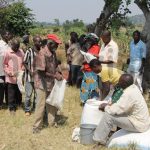The manmade famine, due to three years of conflict, has affected 100,000 people.
The term famine is used according to a globally agreed scale determined by levels of access to food, acute malnutrition and daily deaths due to hunger.
But while the famine has eased, the number of people struggling to find food each day has grown to six million from 4.9 million in February, in what the agencies said was the “highest level of food insecurity ever experienced in South Sudan.”
And the number of people facing emergency levels of hunger — one step below famine — has increased to 1.7 million from one million in February.
“The crisis is not over. We are merely keeping people alive but far too many face extreme hunger on the edge of a cliff,” said the FAO’s director of emergencies Dominique Burgeon.
“The only way to stop this desperate situation is to stop the conflict, ensure unimpeded access and enable people to resume their livelihoods.”
South Sudan, the world’s youngest nation, was plunged into civil war in 2013 after President Salva Kiir accused his rival and former deputy Riek Machar of plotting a coup against him.
The violence — initially between ethnic Dinka supporters of Kiir and ethnic Nuer supporters of Machar — has since spread to other parts of the country, engulfing other ethnic groups.
The United Nations has warned of potential genocide and ethnic cleansing in the country, where there seems to be no prospect of peace in sight.
Farming communities have been driven from their homes, leaving fields unharvested and markets disrupted, and food prices have soared.
More than 3.5 million people have been displaced by the conflict, and tens of thousands killed.
©TimesLive





